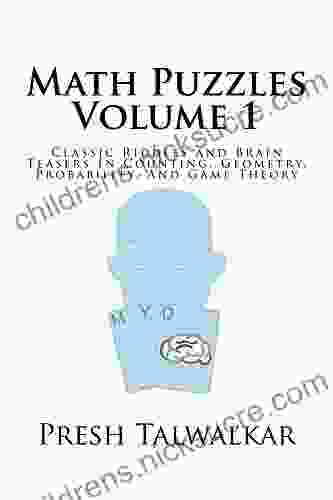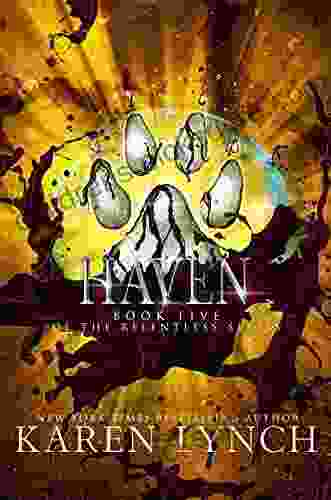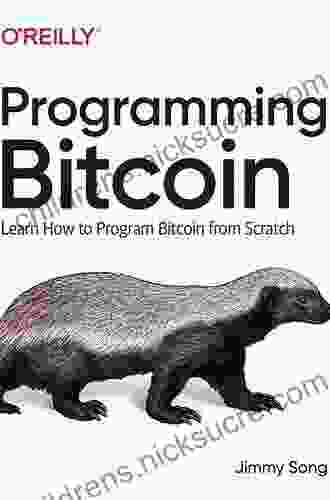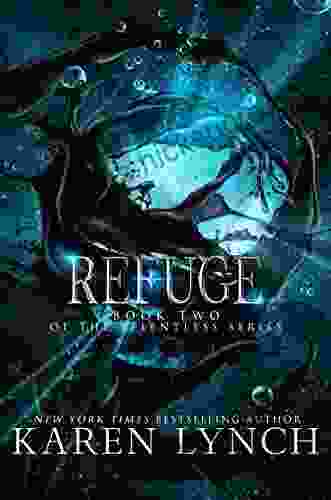Math Puzzles Volume 1: Classic Riddles And Brain Teasers In Counting Geometry Probability And Game Theory

: Unlocking the Mind's Cognitive Playground
Riddles and brain teasers have fascinated and perplexed minds for centuries, challenging our logical thinking, problem-solving skills, and imaginative limits. From the enigmatic puzzles of ancient civilizations to the mind-bending challenges of modern-day geniuses, these captivating conundrums have become an integral part of our collective intellectual heritage. This article delves into the captivating world of classic riddles and brain teasers, exploring their diverse applications in fields such as counting, geometry, probability, and game theory.
The Enigmatic Embrace of Counting Riddles
Counting, the fundamental skill of quantifying objects and events, becomes a playground for creativity in counting riddles. These puzzles require us to apply logical reasoning and mathematical principles to determine the number of objects, people, or steps involved in a given scenario. For example:
A farmer has 12 sheep in his field. Half of them are white, and half of them are black. How many black sheep does he have?
Math Puzzles Volume 1: Classic Riddles and Brain Teasers In Counting, Geometry, Probability, And Game Theoryby Presh Talwalkar4.4 out of 5
Language : English File size : 1188 KB Text-to-Speech : Enabled Screen Reader : Supported Enhanced typesetting : Enabled Word Wise : Enabled Print length : 274 pages Lending : Enabled A train leaves Chicago at 10 AM and travels at 60 miles per hour. Another train leaves St. Louis at 11 AM and travels at 70 miles per hour. If the distance between Chicago and St. Louis is 300 miles, at what time will the two trains meet?
Solving counting riddles sharpens our logical reasoning, challenges our assumptions, and fosters a deeper understanding of mathematical principles.
Geometric Brain Teasers: Unveiling Hidden Patterns
Geometry, the study of shapes and their relationships, offers a rich source of material for brain-teasing challenges. These puzzles test our spatial reasoning, ability to recognize patterns, and understanding of geometric properties. Consider these examples:
A square has a perimeter of 12 inches. What is the length of each side?
A triangle has two angles that measure 45 degrees each. What is the measure of the third angle?
A cone has a radius of 5 cm and a height of 10 cm. What is its volume?
Geometric brain teasers not only sharpen our spatial intelligence but also cultivate our ability to visualize, analyze, and apply geometric concepts in various contexts.
Probabilistic Puzzles: Weighing the Chances
Probability, the measure of the likelihood of an event occurring, adds an element of chance to the world of riddles and brain teasers. These puzzles require us to assess the probability of outcomes, make informed predictions, and understand the role of randomness in decision-making. For instance:
A bag contains 5 red balls, 3 blue balls, and 2 green balls. If you draw a ball at random, what is the probability that it will be blue?
You roll a six-sided die twice. What is the probability that you will get a sum of 7 on both rolls?
A coin is flipped three times. What is the probability that it will land on heads exactly twice?
Probabilistic puzzles hone our ability to analyze random phenomena, make probabilistic predictions, and appreciate the role of uncertainty in real-world decision-making.
Game Theory Brain Teasers: Strategy and Decision-Making
Game theory, the study of strategic decision-making in situations involving multiple agents, provides a captivating platform for brain teasers. These puzzles challenge our ability to anticipate opponents' moves, strategize, and optimize our own decision-making. Take, for example:
The Prisoner's Dilemma: Two suspects are arrested for a crime. They are interrogated separately and offered a deal: if one confesses and implicates the other, the confessor goes free while the other gets a harsh sentence. If both confess, they both get moderate sentences. If neither confesses, they both get light sentences. What should each suspect do?
The Monty Hall Problem: You are on a game show, and you are given the choice of three doors. Behind one door is a car, and behind the other two doors are goats. You choose a door, and the host, who knows what is behind each door, opens one of the other doors to reveal a goat. He then asks you if you want to stay with your original choice or switch to the other unopened door. Should you stay or switch?
The Ultimatum Game: Two players are given a sum of money. One player proposes how to divide the money, and the other player can either accept or reject the proposal. If the proposal is rejected, neither player receives any money. What is the optimal strategy for each player?**
Game theory brain teasers develop our strategic thinking, enhance our understanding of decision-making in the face of uncertainty, and foster an appreciation for the complex interplay of motivations and actions in social interactions.
: The Enduring Legacy of Riddles and Brain Teasers
Riddles and brain teasers continue to enchant and intellectually stimulate people across generations and cultures. They not only provide a fun and engaging mental exercise but also contribute to the development of crucial cognitive skills, such as logical reasoning, problem-solving, spatial intelligence, probabilistic thinking, and strategic decision-making.
The enduring legacy of riddles and brain teasers lies in their ability to challenge our assumptions, ignite our curiosity, and keep our minds sharp and active. Whether we are grappling with the enigmatic intricacies of a counting riddle, unraveling the hidden patterns in a geometric puzzle, calculating the probabilities of a chance event, or strategizing our next move in a game theory challenge, these brain-bending conundrums invite us on a journey of intellectual discovery and cognitive growth.
So, embrace the challenge, delve into the enigmatic world of riddles and brain teasers, and let your mind embark on a captivating cognitive adventure where the boundaries of your thinking are pushed and the frontiers of your knowledge are expanded.
4.4 out of 5
| Language | : | English |
| File size | : | 1188 KB |
| Text-to-Speech | : | Enabled |
| Screen Reader | : | Supported |
| Enhanced typesetting | : | Enabled |
| Word Wise | : | Enabled |
| Print length | : | 274 pages |
| Lending | : | Enabled |
Do you want to contribute by writing guest posts on this blog?
Please contact us and send us a resume of previous articles that you have written.
 Fiction
Fiction Non Fiction
Non Fiction Romance
Romance Mystery
Mystery Thriller
Thriller SciFi
SciFi Fantasy
Fantasy Horror
Horror Biography
Biography Selfhelp
Selfhelp Business
Business History
History Classics
Classics Poetry
Poetry Childrens
Childrens Young Adult
Young Adult Educational
Educational Cooking
Cooking Travel
Travel Lifestyle
Lifestyle Spirituality
Spirituality Health
Health Fitness
Fitness Technology
Technology Science
Science Arts
Arts Crafts
Crafts DIY
DIY Gardening
Gardening Petcare
Petcare Joshua Wright
Joshua Wright Steph Jagger
Steph Jagger Jeff A Johnson
Jeff A Johnson Thomas Lewis
Thomas Lewis David Poyer
David Poyer William J Ray
William J Ray Scott Haugen
Scott Haugen Kathy Fray
Kathy Fray Robert Jervis
Robert Jervis Joan Didion
Joan Didion Cindy Hudson
Cindy Hudson Peter Liljedahl
Peter Liljedahl Eric Hanauer
Eric Hanauer James Nickells
James Nickells Marc Roche
Marc Roche William H Parker
William H Parker Darren Kirby
Darren Kirby Marissa Zwetow Lmft
Marissa Zwetow Lmft Nikki Goth Itoi
Nikki Goth Itoi Val Waldeck
Val Waldeck Tom Mole
Tom Mole Kristen S Kurland
Kristen S Kurland Emma Hansen
Emma Hansen David Robert Grimes
David Robert Grimes Angie Thomas
Angie Thomas Benjamin T Mast
Benjamin T Mast Janet Renner
Janet Renner Susanne Elizabeth Freidberg
Susanne Elizabeth Freidberg Edward B Fiske
Edward B Fiske Anita Biase
Anita Biase Norman Hall
Norman Hall Henry A Giroux
Henry A Giroux Tim Leffel
Tim Leffel Jennie Germann Molz
Jennie Germann Molz Emiko Jean
Emiko Jean Gary Sutherland
Gary Sutherland John Monyjok Maluth
John Monyjok Maluth Samuel G Puryear
Samuel G Puryear Judy Goodspeed
Judy Goodspeed Laurie Varga
Laurie Varga Cynthia Miller Idriss
Cynthia Miller Idriss Christina Tosch
Christina Tosch Anita Knight Kuhnley
Anita Knight Kuhnley Ben Magid
Ben Magid Peter Wacht
Peter Wacht Mark Bertin Md
Mark Bertin Md Marck Vaisman
Marck Vaisman Jennifer Harvey
Jennifer Harvey Michael Edelson
Michael Edelson Tony Butt
Tony Butt Sean Deveney
Sean Deveney Phoenix Nature
Phoenix Nature Doug Cook
Doug Cook Rc Blakes Jr
Rc Blakes Jr Jane Goodall
Jane Goodall Chuck Robbins
Chuck Robbins Clayton Geoffreys
Clayton Geoffreys Chris Townsend
Chris Townsend Carla Hall
Carla Hall Duncan Van Dusen
Duncan Van Dusen Felice Benuzzi
Felice Benuzzi Laurence Gonzales
Laurence Gonzales Bruce Gregor Hodge
Bruce Gregor Hodge Douglas Axe
Douglas Axe Miyamoto Musashi
Miyamoto Musashi Julie Watson
Julie Watson Je Earl
Je Earl One Exam Prep
One Exam Prep Don Jose Ruiz
Don Jose Ruiz Lindsey Hutchinson
Lindsey Hutchinson Stan Lee
Stan Lee Natale Barca
Natale Barca Ann Bausum
Ann Bausum Kumiko Makihara
Kumiko Makihara Wendy Mogel
Wendy Mogel Dick Crouser
Dick Crouser Helen Yang
Helen Yang Jody Vasquez
Jody Vasquez Anjeanette Carter
Anjeanette Carter Becky Choi
Becky Choi Intisar Khanani
Intisar Khanani Paul Hough
Paul Hough Govert Schilling
Govert Schilling Susie Albert Miller
Susie Albert Miller J L Heilbron
J L Heilbron Thomas Thompson
Thomas Thompson Nick Schade
Nick Schade Charlene Beswick
Charlene Beswick William Lee
William Lee Hugh Harris
Hugh Harris Nick Clausen
Nick Clausen Robert A Sadowski
Robert A Sadowski Julie Gianelloni Connor
Julie Gianelloni Connor Russ Mitchell
Russ Mitchell Karl Deisseroth
Karl Deisseroth Larry Greene
Larry Greene David E Maranz
David E Maranz Christina Mcghee
Christina Mcghee Al Goldis
Al Goldis Victoria Clarke
Victoria Clarke Peter Lee
Peter Lee Stanley Vestal
Stanley Vestal Joe Fox
Joe Fox Sherman Dickinson
Sherman Dickinson Simon Winchester
Simon Winchester Discover Press
Discover Press Neil Smith
Neil Smith Cathy Glass
Cathy Glass Oswald Rivera
Oswald Rivera Wendy Moore
Wendy Moore Sean Vigue
Sean Vigue Elwyn Hayes
Elwyn Hayes Tommy Shea
Tommy Shea Sandra Cisneros
Sandra Cisneros Michele Caputo
Michele Caputo Hunter S Fulghum
Hunter S Fulghum Ann Imig
Ann Imig Tina Payne Bryson
Tina Payne Bryson Tim Kimmel
Tim Kimmel Johnegreek
Johnegreek Pete Earley
Pete Earley John Feinstein
John Feinstein Elizabeth Wayland Barber
Elizabeth Wayland Barber Laurie R King
Laurie R King Max M Houck
Max M Houck Brent E Turvey
Brent E Turvey Peter Feinman
Peter Feinman Baby Professor
Baby Professor Jennifer Dugan
Jennifer Dugan Mike Lowery
Mike Lowery Phil G Tang
Phil G Tang Tennille Chaffin
Tennille Chaffin Damo Mitchell
Damo Mitchell Rob Kelley
Rob Kelley Emile Durkheim
Emile Durkheim Shonda Schilling
Shonda Schilling Stewart Pearce
Stewart Pearce Joanna Nylund
Joanna Nylund Kate Bowler
Kate Bowler Ichigo Takano
Ichigo Takano Jean Molesky Poz
Jean Molesky Poz Bruce Feiler
Bruce Feiler Yuri Kitayama
Yuri Kitayama John Krige
John Krige Enrique Desmond Arias
Enrique Desmond Arias Jeremy Griffith
Jeremy Griffith Rosanne S Mchenry
Rosanne S Mchenry Tom Dokken
Tom Dokken Rico Austin
Rico Austin Mark Mayfield
Mark Mayfield John Frohnmayer
John Frohnmayer James Campbell
James Campbell Shane Frederick
Shane Frederick Kalman Samuels
Kalman Samuels Colin Rees
Colin Rees Buster Holmes
Buster Holmes Sharlene Healy
Sharlene Healy Ann Cook
Ann Cook Myron Mixon
Myron Mixon Richard Paul Evans
Richard Paul Evans Jena Pincott
Jena Pincott Judy Cannato
Judy Cannato Caleb Lee
Caleb Lee John Brockman
John Brockman Kevin Callan
Kevin Callan Kevin Robbins
Kevin Robbins D J Taylor
D J Taylor Dorothy Roberts
Dorothy Roberts Ryan Tandler
Ryan Tandler Ariel Dalfen
Ariel Dalfen Gordon Forbes
Gordon Forbes Frank X Sutman
Frank X Sutman Judith A Muschla
Judith A Muschla J Budziszewski
J Budziszewski Brian Smith
Brian Smith Michael Yessis
Michael Yessis Paul Fowler
Paul Fowler Joe Shuber
Joe Shuber Bill Fowler
Bill Fowler Jessica Hall
Jessica Hall Peter Julius Sloan
Peter Julius Sloan Terry Leiden
Terry Leiden Frances Gies
Frances Gies David M Gitlitz
David M Gitlitz Deborah Reber
Deborah Reber Jenny Carr
Jenny Carr J W Lynne
J W Lynne Anita Cortez
Anita Cortez Iain Mccalman
Iain Mccalman Dr Gareth Moore
Dr Gareth Moore Katherine Nichols
Katherine Nichols Frank Mastini
Frank Mastini Katherine Keith
Katherine Keith Johnny Molloy
Johnny Molloy Reed Mangels
Reed Mangels Shannon Philpott Sanders
Shannon Philpott Sanders Michelle Hercules
Michelle Hercules Kenneth Wilgus Phd
Kenneth Wilgus Phd Frederick Lewis Allen
Frederick Lewis Allen Guy Deutscher
Guy Deutscher Jim Grimsley
Jim Grimsley Deborah J Bennett
Deborah J Bennett Presh Talwalkar
Presh Talwalkar L R Shorter
L R Shorter Weston Ochse
Weston Ochse Jessica Redland
Jessica Redland Brook Waters
Brook Waters Barry Correia
Barry Correia T Chris Riley Tillman
T Chris Riley Tillman Marley Hall
Marley Hall Steph Davis
Steph Davis Max Kuhn
Max Kuhn Angie Stanton
Angie Stanton Bill Bishop
Bill Bishop Eric Alpenfels
Eric Alpenfels Ania G
Ania G Illustrated Edition Kindle Edition
Illustrated Edition Kindle Edition Joy Bauer
Joy Bauer J M Thompson
J M Thompson Imre Lakatos
Imre Lakatos Shirley Maclaine
Shirley Maclaine Robin Esrock
Robin Esrock Michael Harris
Michael Harris Behrouz Moemeni
Behrouz Moemeni Hippocrates
Hippocrates Jerry C Whitaker
Jerry C Whitaker Donovan Buck
Donovan Buck Jack O Connor
Jack O Connor James A Fain
James A Fain Benedict Go
Benedict Go Melissa Watson
Melissa Watson Shel Banks
Shel Banks Henny Bogan
Henny Bogan Carl J Pratt
Carl J Pratt Kaylind Olson
Kaylind Olson Remmi Smith
Remmi Smith Sara Zaske
Sara Zaske Tyler Feder
Tyler Feder Scott Douglas
Scott Douglas Sadie Lake
Sadie Lake Brian Platzer
Brian Platzer Dale Grdnic
Dale Grdnic Deena Kastor
Deena Kastor Peter Galison
Peter Galison Marc Weissbluth M D
Marc Weissbluth M D Grant Mcomie
Grant Mcomie Lin Lougheed
Lin Lougheed Beth Berry
Beth Berry Paul Vachon
Paul Vachon Clinton Bailey
Clinton Bailey Scott Keyes
Scott Keyes Jason Rosenhouse
Jason Rosenhouse Sharan B Merriam
Sharan B Merriam Martin L Kutscher
Martin L Kutscher Gina Atencio Maclean Psyd
Gina Atencio Maclean Psyd Shalane Flanagan
Shalane Flanagan Jack El Hai
Jack El Hai Eliot Cowan
Eliot Cowan Erling Kagge
Erling Kagge David Roche
David Roche Dr Mike Dilkes
Dr Mike Dilkes Deborah Hunter Kells
Deborah Hunter Kells Willie Mosconi
Willie Mosconi David J Lieberman
David J Lieberman Jason Aaron
Jason Aaron Jon G Hughes
Jon G Hughes Shannon Greenland
Shannon Greenland Angie Papple Johnston
Angie Papple Johnston Mary O Hora
Mary O Hora Imogen Barnacle
Imogen Barnacle Kristin Knight Pace
Kristin Knight Pace Julie Cwikla Phd
Julie Cwikla Phd Ann Israel
Ann Israel Rachel Levin
Rachel Levin Daxton Wilde
Daxton Wilde Eric B Taylor
Eric B Taylor Lara Maiklem
Lara Maiklem Alex Bonham
Alex Bonham Michael Deshotels
Michael Deshotels J M Gregson
J M Gregson Brendan Leonard
Brendan Leonard Ann Leary
Ann Leary John Heart
John Heart Tabatha Chansard Phd
Tabatha Chansard Phd Ed Robinson
Ed Robinson Tracy Wolff
Tracy Wolff Jeff Deters
Jeff Deters Sue C Funnell
Sue C Funnell Bob Greene
Bob Greene Michael Easter
Michael Easter Comni S Art Publishing
Comni S Art Publishing David Deming
David Deming Erin Davis
Erin Davis Quinn Loftis
Quinn Loftis Lindsey Fitzharris
Lindsey Fitzharris Richard Rorty
Richard Rorty Frank Falcinelli
Frank Falcinelli Douglas Turkington
Douglas Turkington Kit Deslauriers
Kit Deslauriers Sadie Word
Sadie Word Persia Woolley
Persia Woolley Joshua Slocum
Joshua Slocum Anja Beran
Anja Beran Jazmine Mccoy
Jazmine Mccoy R H Charles
R H Charles Richard Karban
Richard Karban Isla Gordon
Isla Gordon John Novosel
John Novosel L A Cotton
L A Cotton Dominique Pearson
Dominique Pearson Richard Weaver
Richard Weaver Kathy Borkoski
Kathy Borkoski Richard J Davidson
Richard J Davidson Flor M Salvador
Flor M Salvador Ronald M Holmes
Ronald M Holmes Cgp Books
Cgp Books Stu Ingraham
Stu Ingraham Stephanie Garber
Stephanie Garber Tami Oldham Ashcraft
Tami Oldham Ashcraft Iri Cermak
Iri Cermak Michael S A Graziano
Michael S A Graziano Elena Delle Donne
Elena Delle Donne Gavin Atkin
Gavin Atkin Helen Czerski
Helen Czerski George Hincapie
George Hincapie John J Kaag
John J Kaag Jan Witkowski
Jan Witkowski Nicholaos Kehagias
Nicholaos Kehagias Anil Ananthaswamy
Anil Ananthaswamy M K Hume
M K Hume Ann Bingham
Ann Bingham Warren Berger
Warren Berger Laura M Ahearn
Laura M Ahearn Kamran Nazeer
Kamran Nazeer Art Clepper
Art Clepper Jade Mckenzie Stone
Jade Mckenzie Stone Robert H Shumway
Robert H Shumway Alana Ash
Alana Ash Miles Cameron
Miles Cameron David Rakel
David Rakel Tracy Salcedo
Tracy Salcedo James Freeman
James Freeman Vera Snow
Vera Snow Edward O Thorp
Edward O Thorp Ann Douglas
Ann Douglas Namit Arora
Namit Arora Dan Hicks
Dan Hicks Sarah J Tracy
Sarah J Tracy Mia Collins Parker
Mia Collins Parker Chad Wesley Smith
Chad Wesley Smith Vicki Lansky
Vicki Lansky Eugene Hecht
Eugene Hecht Chris Matakas
Chris Matakas Jean Paul Pequegnot
Jean Paul Pequegnot Ray Walker
Ray Walker Wade Bourne
Wade Bourne Don Larsen
Don Larsen Mark Wilson
Mark Wilson Roasted Rat
Roasted Rat Steve Economides
Steve Economides Nouaoui Khedidja
Nouaoui Khedidja Little Mat
Little Mat Lisa Gardner
Lisa Gardner Len Kravitz
Len Kravitz Angelo Tropea
Angelo Tropea Larry Mueller
Larry Mueller Brianna Madia
Brianna Madia Scott Cunningham
Scott Cunningham Joshua Straub
Joshua Straub Christof Koch
Christof Koch Tanya Holland
Tanya Holland Ray Dozier
Ray Dozier Gary Robert Muschla
Gary Robert Muschla Magnus D Jango
Magnus D Jango Scholastic
Scholastic Ann Chamberlin
Ann Chamberlin Martina Sprague
Martina Sprague Jimmy Song
Jimmy Song Ryan Boudreaux
Ryan Boudreaux Ron Rhodes
Ron Rhodes Nicholas Wade
Nicholas Wade Daniel Paolicchi
Daniel Paolicchi Steven Cowie
Steven Cowie Stephen G Post
Stephen G Post Sara Dykman
Sara Dykman Rick Clark
Rick Clark Gail Carriger
Gail Carriger Robert Edelman
Robert Edelman Peter Croker
Peter Croker Mari Silva
Mari Silva Ann Mariah Cook
Ann Mariah Cook Simon Boulter
Simon Boulter Rachel Hartman
Rachel Hartman Darlene D Pedersen
Darlene D Pedersen Julie Knutson
Julie Knutson Sankofa Ra
Sankofa Ra Gregory J Stewart
Gregory J Stewart Bryson Payne
Bryson Payne Oliver Horovitz
Oliver Horovitz Molly Harper
Molly Harper Lisa Charlebois
Lisa Charlebois Waysun Liao
Waysun Liao Stephane Cazeault
Stephane Cazeault Joshua Glenn
Joshua Glenn Justin Mcelroy
Justin Mcelroy Mary Helen Bowers
Mary Helen Bowers Dick Pobst
Dick Pobst Sharon Cameron
Sharon Cameron Patricia Ann Lynch
Patricia Ann Lynch Rae Brewer
Rae Brewer Dr Richard L Travis
Dr Richard L Travis Tahereh Mafi
Tahereh Mafi David J Wallin
David J Wallin Sarah Albee
Sarah Albee Robert G Bugge
Robert G Bugge Dr Tracy Sanders
Dr Tracy Sanders Paul Stewart
Paul Stewart Julian Guthrie
Julian Guthrie Bruce Ackerberg
Bruce Ackerberg Julius Evola
Julius Evola Anthony Castrovince
Anthony Castrovince Nancy Ellen Abrams
Nancy Ellen Abrams Dale Peterson
Dale Peterson Philip P Massaro
Philip P Massaro Jenna Tinsley
Jenna Tinsley Karen Lynch
Karen Lynch Eric Wargo
Eric Wargo Jeff Driscoll
Jeff Driscoll John Romer
John Romer Terry Tempest Williams
Terry Tempest Williams Michael Harner
Michael Harner Janet Patkowa
Janet Patkowa Rebecca M Warner
Rebecca M Warner Daniel Harman
Daniel Harman Graham Allcott
Graham Allcott Ray Bergman
Ray Bergman Jim Burris
Jim Burris Elliott Mendelson
Elliott Mendelson 2nd Edition Kindle Edition
2nd Edition Kindle Edition Poul Anderson
Poul Anderson Nims Purja
Nims Purja Mark Chang
Mark Chang Emily Teeter
Emily Teeter Jada Fisher
Jada Fisher Bob Stegner
Bob Stegner Aditya Chatterjee
Aditya Chatterjee Paul Eng
Paul Eng Emily R King
Emily R King Dean Karnazes
Dean Karnazes Sandra Steingraber
Sandra Steingraber Karen Jettmar
Karen Jettmar Lori Morrison
Lori Morrison J M Adovasio
J M Adovasio Sean Parker Dennison
Sean Parker Dennison Dickie Bird
Dickie Bird Felicity Aston
Felicity Aston Brian Burke
Brian Burke Ann Cameron
Ann Cameron Sarah Pink
Sarah Pink Jean Rose
Jean Rose Tabatha Yeatts
Tabatha Yeatts Tri Thong Dang
Tri Thong Dang Emma Anne Bellamy
Emma Anne Bellamy Will Murray
Will Murray Chris Dombrowski
Chris Dombrowski Vivienne Crow
Vivienne Crow Megan Hallett
Megan Hallett Lisa Hoehn
Lisa Hoehn Sherri Mitchell
Sherri Mitchell Robin Barrett
Robin Barrett Bookrags Com
Bookrags Com Mayur Movalia
Mayur Movalia Robison Wells
Robison Wells Paul Twitchell
Paul Twitchell Ava Richardson
Ava Richardson Elizabeth G Harper
Elizabeth G Harper William S Frisbee Jr
William S Frisbee Jr Sara Wolf
Sara Wolf Wendy Lyons Sunshine
Wendy Lyons Sunshine Elisa S Amore
Elisa S Amore Evelyn Monahan
Evelyn Monahan F C Yee
F C Yee Antonia Malchik
Antonia Malchik Terry Hill
Terry Hill Josh Kaufman
Josh Kaufman Elissa Altman
Elissa Altman Beth Cavenaugh
Beth Cavenaugh Michael Kranish
Michael Kranish Fred Heath
Fred Heath Sharon N Covington
Sharon N Covington Paul Volponi
Paul Volponi Beth A Grosshans
Beth A Grosshans Susan Zimmermann
Susan Zimmermann Steven Dillon
Steven Dillon Danielle Centoni
Danielle Centoni Marke Bieschke
Marke Bieschke Brian Hayden
Brian Hayden Rebecca Rolland
Rebecca Rolland Kim Loraine
Kim Loraine Sherrie Eldridge
Sherrie Eldridge Tyler Ninja Blevins
Tyler Ninja Blevins Ann Marie Brown
Ann Marie Brown Tim Guest
Tim Guest
Light bulbAdvertise smarter! Our strategic ad space ensures maximum exposure. Reserve your spot today!
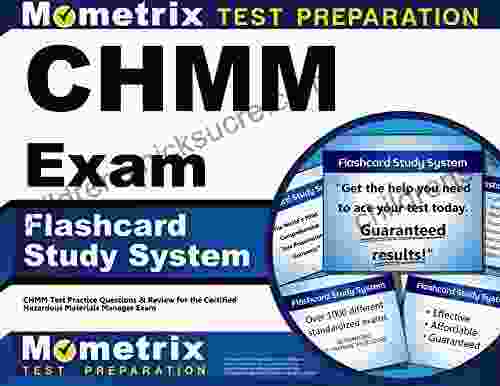
 Ernest J. GainesUnleashing the Power of the Chmm Exam Flashcard Study System: A Comprehensive...
Ernest J. GainesUnleashing the Power of the Chmm Exam Flashcard Study System: A Comprehensive...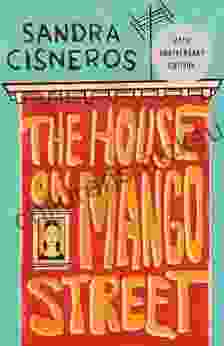
 Spencer PowellThe House on Mango Street: A Profound Exploration of Identity, Home, and the...
Spencer PowellThe House on Mango Street: A Profound Exploration of Identity, Home, and the... Milton BellFollow ·11.1k
Milton BellFollow ·11.1k Jayden CoxFollow ·6.6k
Jayden CoxFollow ·6.6k Robin PowellFollow ·17.7k
Robin PowellFollow ·17.7k Derek BellFollow ·7.5k
Derek BellFollow ·7.5k Julio Ramón RibeyroFollow ·19.1k
Julio Ramón RibeyroFollow ·19.1k Paul ReedFollow ·4.1k
Paul ReedFollow ·4.1k Kendall WardFollow ·17.7k
Kendall WardFollow ·17.7k Joseph HellerFollow ·14.4k
Joseph HellerFollow ·14.4k

 Ernest J. Gaines
Ernest J. GainesMy Golf Blog Revolution: Open Stance
Are you ready to revolutionize your golf...
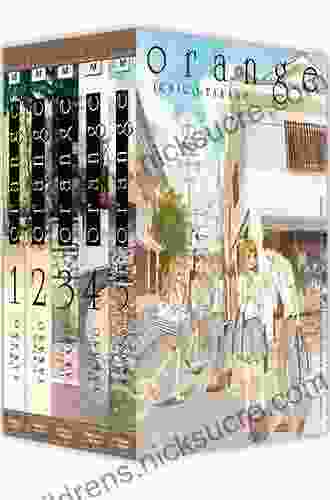
 Gene Powell
Gene PowellThe Unparalleled Genius of Calculus Volume Ichigo Takano:...
: The Birth of a...
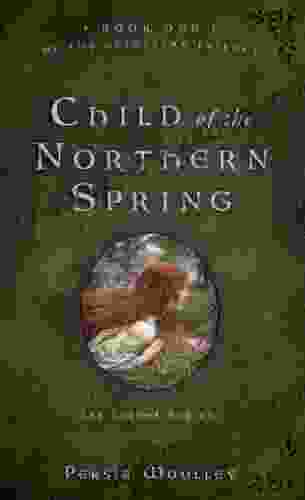
 Edgar Hayes
Edgar HayesChild of the Northern Spring: A Journey of Discovery and...
In the heart of...

 Anthony Wells
Anthony WellsHybrid Aria: A Harmonious Blend of Modern Comfort and...
In the heart of a bustling...
4.4 out of 5
| Language | : | English |
| File size | : | 1188 KB |
| Text-to-Speech | : | Enabled |
| Screen Reader | : | Supported |
| Enhanced typesetting | : | Enabled |
| Word Wise | : | Enabled |
| Print length | : | 274 pages |
| Lending | : | Enabled |


